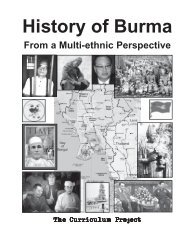Student's Book â Dec 2009 (5.9mb) - The Curriculum Project
Student's Book â Dec 2009 (5.9mb) - The Curriculum Project
Student's Book â Dec 2009 (5.9mb) - The Curriculum Project
You also want an ePaper? Increase the reach of your titles
YUMPU automatically turns print PDFs into web optimized ePapers that Google loves.
previewdefiningSome people say that human civilisation began when groups of people came togetherand began to develop culture. In fact, for some people, culture and civilisation meanthe same thing. What do you know about culture?Read the paragraph:When a group of people share the same way of life, we say that they have the same culture. Thisusually means that they speak the same language, eat the same kinds of food, have the same rulesof behaviour and follow the same customs and traditions.Do you agree with this definition? Would you add or change anything?exerciseclassifying,making lists,applyinginformationLook at the box of words on the right:sport, weddings, fishpaste,school, your name, the clothesA. Which words in this list are part of culture?you wear, your house, religion,B. What can you add to this list?music, village, festival, yourC. Now make a list of things that are not part of culture. family, languageD. Imagine that you lived thousands and thousands ofyears ago, when the first human towns were firstbuilt. Which words do you think might have been part of your culture?exercisemap work,compare andcontrastLook at the highlighted areas on the map.A. What countries arethey in?B. What similarities canyou notice aboutall the highlightedareas?C. Why did civilisationsbegin in river valleys?Map 3: Ancient Asia<strong>The</strong> earliest civilisations were developed by people living in fixed places or settlements, whichgradually grew into towns and cities. <strong>The</strong> first civilisations began in river valleys such as thevalleys of the Nile in Egypt, the Tigris-Euphrates (ti-gris; yoo-fray-tees) in Mesopotamia (mesoh-poh-tay-mi-yah),the Indus (in-dus) in India, and the Huanghe (hwang-he)in China.discussionbrainstormingWhat do you know about the four areas of first civilisations? Why do you thinkcivilisations developed in these places?12













![[Eng] Nov 2012 DRAFT - The Curriculum Project](https://img.yumpu.com/45590859/1/184x260/eng-nov-2012-draft-the-curriculum-project.jpg?quality=85)


